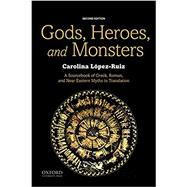Offering an expansive view of the ancient Mediterranean world, Gods, Heroes, and Monsters: A Sourcebook of Greek, Roman, and Near Eastern Myths in Translation, Second Edition, presents essential Greek and Roman sources--including work from Homer, Hesiod, Virgil, and Ovid--alongside analogous narratives from the ancient Near East--Mesopotamia, Egypt, the Hittite kingdom, Ugarit, Phoenicia, and the Hebrew Bible. Some of the sources appear here in English translations for the first time.
This collection stresses cultural continuities and comparisons, showing how Greek and Roman myths did not emerge in a vacuum but rather evolved from and interacted with their counterparts in the ancient Near East. Reinforcing this more inclusive definition of "classical," it is organized thematically, which allows readers to excamine each category of myth in a comparative and cross-cultural light. For example, "Part III: Epic Struggles: Gods, Heroes, and Monsters" provides sources that feature Greek heroes like Heracles, Apollo, Achilles, and Hector along with the Epic of Gilgamesh and other ancient Near Eastern selections that focus on the hero.
Gods, Heroes, and Monsters, Second Edition. shows how the literature, inhabitants, and intellectual traditions of Greece and Rome and the ancient Near East were inextricably intertwined. The book is enhanced by a vibrant, full-color, 16-pg. photo insert, and many new translations by editor Carolina López-Ruiz and others.








